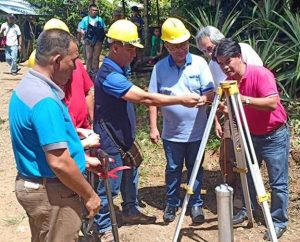
IPIL, Zamboanga Sibugay – The Department of the Interior and Local Government (DILG), through its Conditional Matching Grant to the Provinces program, has allocated some PHP113 million for the concreting of a seven-kilometer farm-to-market-road (FMR) in the nearby town of Tungawan.
The road concreting project will traverse three far-flung barangays – Datu Tumanggong, Loboc and Malongon – that are the sources of vegetables of this provinces and nearby areas.
“This project aims to boost agricultural production in the municipality of Tungawan,” Governor Wilter Yap Palma on Monday said. The road, once completed, will provide easy access to the farmers.
Palma led the groundbreaking on Thursday (Oct. 11) that signaled the start of the concreting project. He was joined by Vice Governor Eldwin Alibutdan, Tungawan Mayor Carlan Climaco and DILG Provincial Director Oliver Ombos.
Climaco said the three barangays are home to 4,725 farmers, majority of whom belong to the indigenous peoples (IPs) community consisting of Subanen and Kalibugan tribes engaged in vegetable farming and other high-value crops.
Palma said the completion of the project will answer the long-standing dreams of the IPs to have easy access to the market.
Palma said the farm-to-market-road concreting is the fourth project that is part of the “Build, Build, Build” Program of President Rodrigo Duterte implemented in this province through the DILG’s Conditional Matching Grant to the provinces.
“The lack of accessibility poses as a major problem especially to our farmers in transporting their products and during emergencies,” said Engineer Venancio Ferrer III, provincial planning and development coordinating officer.
Ferrer said the project would reduce travel time in transporting goods and reduce the cost of transport.
“Rural transport does not only concern the movement of farm produce but also helps families’ tasks such as procuring food, water, and fuel,” Alibutdan said.
He said farm-to-market-roads serve as vehicle in improving rural economy and foundation of modern agriculture.
Tungawan, which consist of 25 barangays, is a second-class town in this province with a population of 42,030 as of the 2015 census.
Tungawan is the largest town in the province with an area of 47,328 hectares. The town’s products include vegetables, rubber, coconut, corn, rice, and seaweeds. (Dennis Baguio/PNA)
